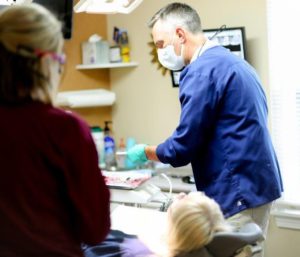HOW OFTEN SHOULD YOU GO?
August 23, 2021
 Despite the generalized notion that people should visit a dentist bi-annually, I am more a proponent of individualized frequency recommendations based on a few factors. We are not all the same; therefore, each of us has our own specific needs.
Despite the generalized notion that people should visit a dentist bi-annually, I am more a proponent of individualized frequency recommendations based on a few factors. We are not all the same; therefore, each of us has our own specific needs.
Results from a recent Gallup-Healthways poll of 355,334 Americans indicate that more than one-third of the population, 34% to be exact, did not visit a dentist last year at all. Over 50% of the population said they visited the dentist one time or less last year.
In a study reported in The New York Times and other major media, a report by the Journal of Dental Research indicates “little evidence supports biannual preventive care for all adults.” Similarly, the headline from HealthDay News read, “Annual Dental Cleaning May be Enough for Some.”
The researchers explored the association between long-term tooth loss and the frequency of preventive dental visits in adults with and without three risk factors for periodontal disease: smoking, diabetes and interleukin-1 genetic variations (regulates immune and inflammatory responses). Subjects were deemed low risk if they had none of these factors.
The data showed that as a group the high-risk patients who had two preventive dental visits lost significantly fewer teeth compared to the high-risk group that had only one preventive dental visit per year. By contrast, there was no difference in tooth loss for the groups at low-risk based on one versus two preventive visits per year. The researchers concluded that individual risk factors should dictate the frequency of cleanings.
The American Dental Association recommends regular dental visits at an interval determined by the patient’s dentist. The patient’s dentist makes an individualized recommendation based on the patient’s health history and current oral health status.
Here are some points that may help you understand the study and the importance of personalized care:
- The key takeaway from this study is that personalized oral care—taking into account your oral and overall health history—is necessary for good dental health.
- The study only looked at tooth extraction and its association with risk factors for gum disease; however, other health conditions can contribute to poor oral health. That’s why personalized dental care is critical to good patient care.
- Personalized treatment plans should be the priority. Recommendations for future dental appointments should be based on what is seen during your examination, your health history, and any concerns you may have about your oral health.
- The American Dental Association’s website at www.mouthhealthy.org has a lot of information on how to take care of your oral health between dental visits.
While there is clearly a segment of the population who can “get away” with visiting a dentist once a year to maintain a healthy mouth, this group is relatively small. 75% of the population has some form of gingivitis or periodontal (gum) disease. Within that group, there are those who should see a dentist/hygienist twice per year, some three times and others four times or more to maintain proper health.
It is up to you and your dentist to have an open conversation about how often you should go. If it has been a while, getting there the first time is step number one.
Dr. St. Clair maintains a private dental practice in Rowley and Newburyport dedicated to health-centered family dentistry. He has a special interest in treating sleep apnea and TMJ problems. If there are certain topics you would like to see written about or questions you have please email them to him at jpstclair@stclairdmd.com
No Comments
No comments yet.
RSS feed for comments on this post.
Sorry, the comment form is closed at this time.







